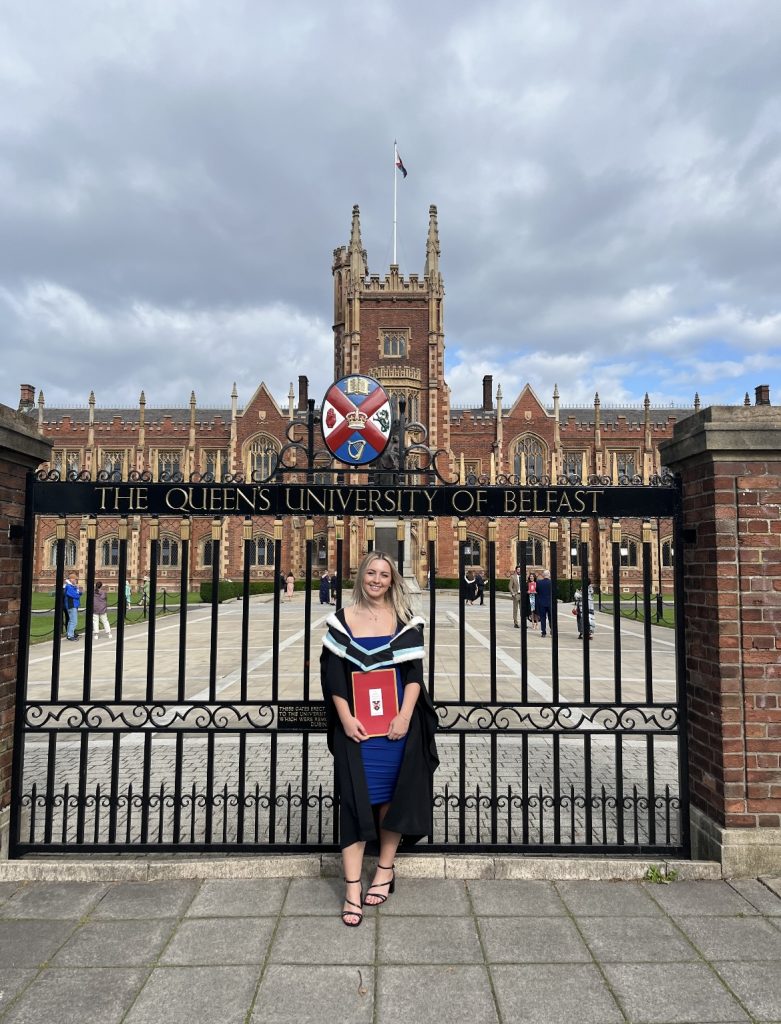This post is part of our Research Initiation Scheme for 2023-2024.

What has your university journey been like so far?
During my A-level studies I au-paired in Spain and I really enjoyed using the language there. I did History and Spanish for my undergraduate degree [at Queen’s] because I didn’t want to lose my Spanish and I found the Spanish side more interesting for me and that’s how I have come to do an MRes [Master of Research] now.
So, tell me about your current research project: ‘Genre and gender in female authored narco-novelas’.
It looks at female narco-novelas which are women-authored books about drug trafficking. I’m looking at Perra Brava by Orfa Alarcón, who is a Mexican author, El Leopardo al Sol by Laura Restrepo, who is a Colombian author, and Pistoleros by Paula Castiglioni, who is an Argentinian author. So, my scope is across Latin America. From what I have seen, most of the productions on drug trafficking, like TV series, focus on male figures so I thought it would be interesting to look at a female-narrated point of view and the portrayal of women and see how that is different.
Where did your interest in this topic come from?
I enjoyed Sarah Bowskill’s module on US/Mexican border issues during second year and then in final year I did Sarah’s other module, on Roberto Bolaño’s 2666, which touched on the issue of drug trafficking. I really enjoyed the further readings that were set within these two modules and believe the good grades I achieved were down to how much I enjoyed the content. Then when I heard about the MRes and how flexible it was, I decided to do that, and I also got funding which has helped.
Since starting your research what have you found to be the most interesting aspect of doing research?
I have found the readings to be really interesting. At the moment I am doing an essay on Netflix’s Griselda and some of the readings have been written by academics within the fields of criminology and sociology and so I am able to read a variety of different disciplines and realise how they can inform a project.
What have you found challenging during your research?
The reading is endless and so many ideas come out of the readings. I have struggled with narrowing those down because at the start 20,000 words [the length of the MRes dissertation] seems so intimidating, but now I know that I am not going to be able to write about everything that I want to. In the meetings with my supervisor, Sarah Bowskill, we have been discussing my corpus and there have been things cropping up in the text that I think would have been interesting but don’t really fit into my working dissertation.
What advice would you give to undergraduate students considering an MRes?
I would say go for it. I think it can seem intimidating if you have not done a dissertation at undergraduate level, which I hadn’t, but I found the MRes to be structured in a way that they ease you into it. This means that I have not found it too overwhelming. Also, it is your research so you get so much freedom with it and can tailor it to your interests.
What do you hope to do after your masters?
I’m going to go travelling around South America after my graduation in January. I am not entirely sure what’s after that. I would like to go further into research as a career and I am also considering doing a PhD.
Interview by Erin Nelson, final-year undergraduate in Anthropology and Spanish
Editor’s note:
Isabel’s MRes studies are supported by a Bulletin of Spanish Studies William C Atkinson Postgraduate Scholarship.
Read more about the MRes in Arts and Humanities offered at Queen’s University Belfast at https://www.qub.ac.uk/courses/postgraduate-taught/arts-humanities-mres/#overview.